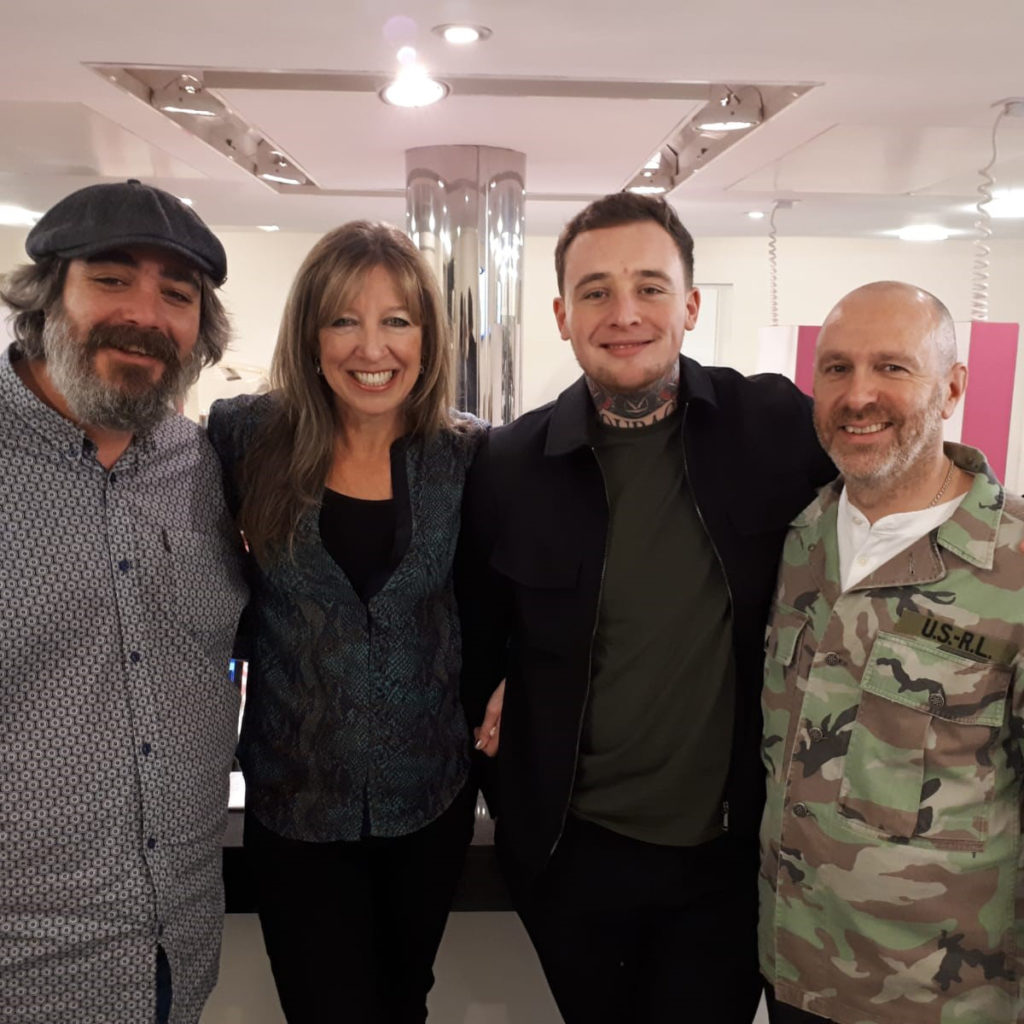This National Careers Week, we’ve been sharing inspiring stories from learners who’ve achieved their dream careers.
Today, we are spotlighting rising star, Oscar Jay, a former learner from Alan d Hairdressing Education, now a Graduate Stylist at London’s award-winning Richard Ward Hair & Metrospa. We were also lucky enough to speak with Oscar’s employer, hair and beauty industry luminary, Hellen Ward.
Oscar completed his VTCT Level 2 and 3 Diplomas in Hairdressing at Alan d’s London academy.
 He joined Richard Ward Hair as a Senior Apprentice and has since rocketed his way to Graduate Stylist, having qualified approximately two years ago.
He joined Richard Ward Hair as a Senior Apprentice and has since rocketed his way to Graduate Stylist, having qualified approximately two years ago.
Despite his love for hairdressing now, Oscar didn’t always know he wanted to work in this field: “I did a host of things before- I went to drama school and worked in fashion and retail.” Oscar’s mum suggested barbering and he looked at some courses. However, during a visit to a hair exhibition, Oscar was blown away and realised that was what he wanted to be doing.
In Oscar’s experience, apprenticeships carry a lot of challenges but also many rewards due to the hands-on learning experience they provide. He explains: “It’s a challenging job. Your workload is a lot, especially in a large salon. You’re the first point of contact between a salon’s client and stylist. You have to know how everything works.”
The payoff for this though is that being immersed in the salon environment means you learn from what’s going on around you: “Being an apprentice is so important because you can sit there and watch, can pick up small little nuances.”
Oscar suggests an apprenticeship helps to bridge the gap between your studies and going into the workplace, as a learner “might come out of college with the fundamentals but be unprepared for the floor.” When starting out in a salon, Oscar says you “have to ask questions” and take advantage of the colleagues around you who have been in your shoes.
He admits, “once you get on the floor, it’s a whole new ball game”, explaining it’s not just the hairdressing but also aspects such as time management, people skills and managing expectations that you need to master. Oscar makes it clear that there’s a lot more to hairdressing beyond the cutting and styling: “no one knows what goes into being a hairdresser.”
Oscar describes how “consultation is the most important part. I learnt that here at Alan d. I remember watching Kev (Kevin Day, Academies Principal) delivering one. You need to sit down, look the client in the eye and ask ‘what are we doing today?’ If they don’t know what they want, you need to know what questions to ask, for instance, what do they normally do with their hair, what do they like or not like about their hair, what is their face shape?”
It’s key to get this consultation right and understand what the client wants as “hair is people’s safety blanket. It’s their pride and joy.”
There are some aspects of the job, it is more difficult to train for, as Oscar admits “there’s no preparation for the moment someone cries in your chair.”
Yet, maintaining a cool and friendly exterior, whatever the day throws at you, is crucial as you “have to be the same with the last client and you are with the first.”
Despite the challenging moments, there are, of course, obvious highs in seeing clients walk away happy and building up a loyal client base who specifically request you to cut their hair.
For Oscar, hairdressing is “an exciting industry to be in” with lots of opportunities for growth and development. He notes, “from the moment you become a hairdresser, you never stop learning until the day you retire…I believe you should always be pushing yourself. In hair, it’s so easy to get more.”
Oscar’s passion is the creative element of hairdressing and in the future, he would “like to be the artistic director at Richard Ward” – a role with creativity at its core.
It’s apparent that Richard Ward Hair offers plenty of opportunities for progression and supporting their employees with the areas that interest them best. Oscar explains: “styling and cutting is in one room and colour is in another. You go down one route or the other. They want you to become an expert in your field.”
Oscar explains that at Richard Ward Hair, “we are a business within their business.” Each member of the team has “to learn to market themselves.”

Hellen Ward and Oscar Jay, both centre
Hellen describes this approach to us in a little more detail, explaining “we’re serious about their future, they’re not here just to sweep up.”
Using the analogy of “the flight path at Heathrow”, Hellen describes how she likes “to see the planes land.” It is supporting her employees’ career arcs, once they have ‘landed’ and qualified that Hellen finds the most rewarding part of working with apprentices.
At this point, Hellen “can help them discover their specialities” as they “decide which way to go and realise their strengths.”
It is important for each team member to develop an area of specialism. Hellen likens the process to making a cake: “we’ll make the Victoria sponge together and then they can decorate it how they like. They each need a different topping or flavour; they can’t all be vanilla. They all need to be good at different things.”
This is to their ultimate benefit, Hellen explains, as the more specialised and expert they are, the higher price the salon can get for their services.
Another key benefit of this approach is that there is no pressure for anyone to do something that they are not good at. Hellen is a big believer in “doing what you’re good at” and tells her team they “don’t need to be perfect at everything. If you’re rubbish at that, then don’t do it.”
Hellen has certainly followed her strengths and talents in her own career. She started as a hair apprentice herself in an Army & Navy department store. Whilst she loved the salon environment, Hellen didn’t love the hairdressing element and found herself taking an interest in the business side.
Realising her ambition lay in salon management, Hellen made this her focus, worked her way up and was soon running that salon she had trained in. She was promoted to Assistant Regional Manager, then Regional Manager, roles which took her all around the country.
Missing London, Hellen moved back and became General Manager of Harrods Hair and Beauty Salon, Children’s Salon and Barber Shop. At just 23, Hellen was managing the biggest salon in Europe, with 120 staff and 40 beauty rooms. As opposed to her regional roles which saw her travelling, Hellen “loved having one big salon, with everyone in one place.”
Hellen’s next challenge was transferring to the struggling Neville Daniels salon in Knightbridge, which was running at a deficit. It was here that she met Richard. Together they purchased the salon and set about the task of turning it around. Hellen explains rebuilding the salon was a lengthy process: “We mopped our own floors, and started with a tiny team of 5. It took us so long to build it up. Slowly we started to make a profit.”
Remarkably that team of 5 are still with them today, though the business has since moved premises and rebranded as Richard Ward.
Today, Hellen is not only Director and Co-founder of the award-winning salon, which is “the largest independent salon in England” but also a leading business trend commentator, educator and lecturer in the sector.
Oscar explains that clients fly up from Guernsey and down from Edinburgh to come to Richard Ward.
It’s not surprising that the exclusive salon, based in Chelsea’s Sloane Square, is very in-demand. Clients receive a five-star service and have the option to visit the licensed bar in the waiting area, or order breakfast, lunch or dinner from the kitchen, not forgetting the luxurious spa. “It’s a powerhouse,” says Oscar.
Oscar is one of approximately 95 staff at the salon. There are also usually a minimum of around 15 apprentices at the salon; Alan d have been working with Richard Ward in training their apprentices for around 4 years.
Hellen is a strong proponent for apprenticeships and says she “gets frustrated that apprenticeships are not more of an option” for young people. Many get encouraged to take the university route instead, but she points out that “some individuals learn best on the job.” She notes that she has no degree in business yet runs a successful business, and has written books on the subject.
Apprenticeships are key to the salon and Hellen explains, “nurturing our young team is critical for the business. We don’t recruit from the outside.”
Her mantra is “take an oak tree, plant it and hope it stays.” This seems to be a successful formula for Richard Ward as they have an impressively low staff turnover of around 4% – the industry average being around 25%.
When asked what advice Hellen would give to somebody undertaking an apprenticeship, Hellen advises “choose your salon carefully; make sure they have a proven track of using apprentices as a route to progression. Ask ‘how many of your apprentices go onto to stay in the company and become full-time employees?’”
Hellen tells us they have one team member at Richard Ward that came to them as a trainee for work experience, then became a Saturday girl, and has now worked her way up to senior stylist. It is unsurprising they have such a loyal staff base. Hellen professes it is “more like a family than a workplace.”
We met Oscar and Hellen during our visit to Alan d’s London centre during National Apprenticeship Week. You can read more about our visit in part one and part two.
You can find out more about Alan d apprenticeships on their website or visit their social channels –
Facebook , Instagram and Twitter
